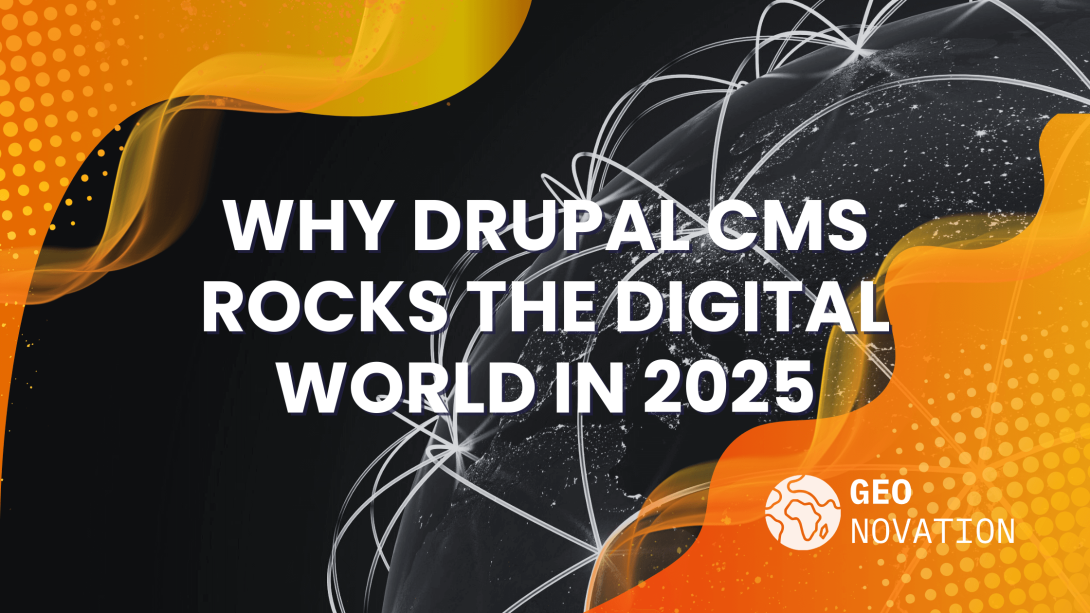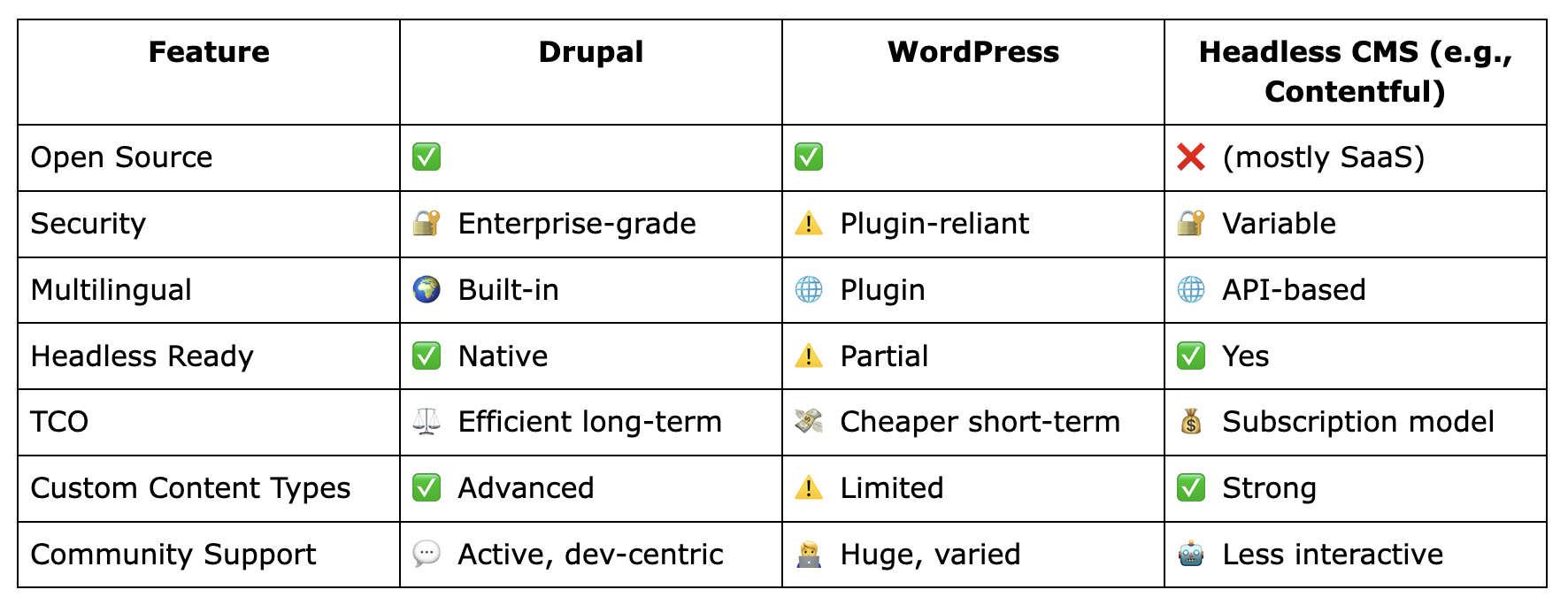- Home
- Why Drupal Leads CMS In 2025
Why Drupal Leads CMS in 2025

17 May, 2025
In the fast-evolving digital landscape, choosing the right content management system (CMS) is more than a technical decision, it's a strategic one. While the CMS market is flooded with options ranging from the ubiquitous WordPress to newer headless CMS platforms, Drupal continues to stand out as a robust, secure, and scalable solution.
But what really differentiates Drupal from the rest in 2025? This blog dives deep into the unique value propositions of Drupal, contrasting it with other leading CMSs and exploring why its future-focused architecture makes it an ideal choice for developers, enterprises, and nonprofits alike.
🧭 Want to know why Drupal is the best CMS for nonprofits and NGOs? Read our in-depth guide: Why Drupal Is the Best CMS for Nonprofits & NGOs
1. CMS Market Evolution in 2025: A Brief Overview
In 2025, the CMS landscape is split between monolithic platforms (like WordPress), headless CMS options (like Strapi or Contentful), and enterprise-grade systems (like Sitecore or Adobe Experience Manager). However, Drupal straddles both flexibility and power, offering a hybrid architecture that’s uniquely future-proof.
With digital transformation accelerating across sectors, organizations are demanding more from their CMS: personalized experiences, robust security, modular architecture, multilingual support, and seamless integrations with AI tools.
And this is where Drupal shines.
2. The Core Philosophy: Structure Over Simplicity
WordPress: Built for Simplicity
WordPress has succeeded because of its simplicity and low barrier to entry. It’s ideal for small businesses, bloggers, and users with minimal technical skills. The plugin ecosystem is vast, but can also become a maintenance and security liability as sites scale.
Drupal: Engineered for Customization
Drupal, on the other hand, embraces complexity to deliver flexibility. It's built for structured content, reusable components, and custom data models—features essential for large organizations with specific workflows and compliance needs.
Key Differentiator: Drupal’s Configuration Management System allows developers to version-control their configuration, making it ideal for continuous deployment and enterprise-level development pipelines.
3. Security & Compliance: Drupal’s Unshakeable Fort
One of the most significant advantages of Drupal is its security-first approach. Used by government agencies, banks, and NGOs, it adheres to strict security protocols and is regularly audited by a global security team.
Compare this to WordPress, which remains a top target for hackers due to its popularity and reliance on third-party plugins.
Drupal has earned the reputation of being the CMS of choice for high-security websites, including NASA, UNESCO, and the European Commission.
If your organization needs GDPR compliance, access control, and secure workflows, Drupal isn’t just an option, it’s a requirement.
4. Performance and Scalability
WordPress: Struggles at Scale
WordPress websites can perform well with caching and optimization, but they often buckle under the pressure of high traffic, especially when relying heavily on plugins.
Drupal: Born for High Performance
Drupal is optimized for enterprise performance and high-traffic environments. Its caching strategies, decoupled front-end capabilities, and load-balanced architecture make it perfect for large-scale operations.
Example Use Case: Universities with thousands of pages and user types often choose Drupal for its taxonomy systems, faceted search, and role-based permissions.
5. Headless CMS & API-First Architecture
The future of the web is headless, and Drupal anticipated this shift years ago. With native support for JSON:API, GraphQL, and RESTful services, Drupal enables seamless integration with React, Vue, or mobile apps out of the box.
Compare this to WordPress, which only introduced a REST API in recent years and still struggles with clean decoupling due to its legacy structure.
If you’re building a progressive web app (PWA) or a multi-channel content strategy, Drupal’s API-first architecture offers unparalleled flexibility.
6. Community and Innovation
Drupal’s strength lies in its global open-source community. Every line of code is built by developers who are passionate about building ethical, scalable, and secure digital experiences.
In 2025, the community’s focus has shifted toward:
- AI integration for content personalization
- Low-code content authoring
- Sustainable and green web practices
- Improved accessibility (WCAG 2.2+)
You’re invited! Join the upcoming Sofia Drupal Meetup to explore the future of Drupal with fellow developers and digital architects: Sofia Drupal Meetup Event – May 2025
7. Total Cost of Ownership (TCO)
While Drupal may involve higher upfront development costs, it pays off long-term with:
- Fewer plugin-related breakdowns
- Lower maintenance cycles
- Future-ready architecture
In contrast, a WordPress site might require frequent manual updates, plugin audits, and costly migrations down the road.
8. Content Authoring Experience: No Longer a Weak Spot
For years, one critique of Drupal was its backend UX. That has changed with Drupal 10+.
- Layout Builder empowers editors to design landing pages visually.
- Claro Admin Theme modernizes the backend interface.
- CKEditor 5 enhances rich content creation.
This makes Drupal competitive with other CMSs that prioritize ease of use while still retaining its technical edge.
9. Multilingual & Global Readiness
Drupal has native multilingual capabilities built into its core. You can manage content in multiple languages, configure language-based views, and set translation workflows, all out of the box.
Most CMSs, including WordPress, require plugins to achieve even basic multilingual support, creating fragmented experiences and added complexity.

11. Real-World Case Studies
NGO Website Migration
A large international NGO migrated from WordPress to Drupal to improve performance, introduce granular editorial permissions, and gain multilingual capabilities.
Outcome:
- 75% reduction in page load time
- Multilingual content management in 10 languages
- Decoupled mobile app integration
Explore more in our comparative analysis: Drupal vs. WordPress – Which CMS is Right for Your Website?
12. Future-Proofing with Drupal
The digital future demands systems that can:
- Scale dynamically
- Integrate AI and machine learning
- Serve content across channels
- Ensure accessibility and inclusivity
Drupal delivers on all fronts, with a roadmap focused on low-code tools, editorial UX, and sustainable web development.
In a time when data privacy, performance, and personalization are front-and-center, Drupal offers the resilience, flexibility, and transparency needed to build not just websites, but digital platforms for the future.
Final Thoughts: Why the Difference Matters
The difference between Drupal and other CMS platforms is not superficial, it’s foundational. Drupal is not just a CMS; it’s a digital experience framework.
If you’re a startup looking to launch quickly with limited tech skills, WordPress may suffice. But if you’re building something meant to scale, secure, and last, there’s no contest: Drupal is the answer.
Don’t Miss Out
Join us in Sofia this May to meet Drupal developers, discuss the latest trends, and explore how Drupal is evolving: 👉 Register Now – Sofia Drupal Meetup
✍️ Continue Your Journey
- Why Drupal Is the Best CMS for Nonprofits & NGOs
- Drupal vs. WordPress – Which CMS Is Right for Your Website?
Ready to Build Something That Lasts?
At Geonovation, we don’t just implement CMS platforms, we architect future-ready digital ecosystems. If your organization needs more than a simple website, if you require structure, security, scale, and long-term reliability, Drupal is the foundation you’ve been looking for.
We help NGOs, enterprises, and institutions transition from fragile systems to resilient platforms by:
✅ Designing CMS infrastructures tailored to your goals
✅ Migrating from legacy systems like WordPress with precision
✅ Leveraging Drupal’s API-first and multilingual strengths
✅ Optimizing for security, compliance, and long-term performance
Let’s talk about how we can help future-proof your digital presence.
Book a free consultation with our team and explore how Drupal can transform your organization’s content strategy.